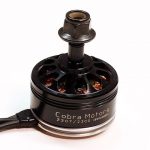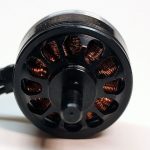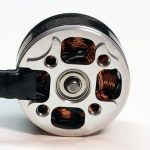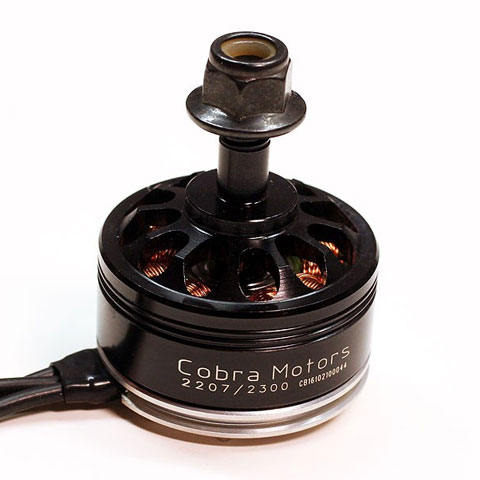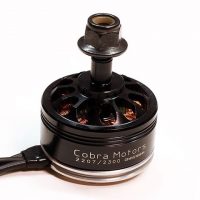Please note this is Double Pack motors meaning you will get 2 x CP2207 2300KV CCW motor
Specs:
| Cobra CP-2207/2300 Motor Specifications | |
| Stator Diameter | 22.0 mm (0.866 in) |
| Stator Thickness | 7.0 mm (0.276 in) |
| Number of Stator Slots | 12 |
| Number of Magnet Poles | 14 |
| Motor Wind | 15 Turn Delta |
| Motor Kv Value | 2450 RPM per Volt |
| No Load Current (Io) | 1.85 Amps @ 14 Volts |
| Motor Resistance (Rm) per Phase | 0.045 Ohms |
| Motor Resistance (Rm) Phase to Phase | 0.03 Ohms |
| Maximum Continuous Current | 32 Amps |
| Max Continuous Power (3-cell Li-Po) | 350 Watts |
| Max Continuous Power (4-cell Li-Po) | 480 Watts |
| Max Continuous Power (5-cell Li-Po) | 575 Watts |
| Motor Weight | 35 grams (1.26 oz.) |
| Outside Diameter | 27.9 mm (1.098 in.) |
| Motor Shaft Diameter | 3.00 mm (0.118 in.) |
| Prop Shaft Diameter | 5.00 mm (0.197 in.) |
| Motor Body Length | 21.0 mm (0.827 in.) |
| Overall Shaft Length | 36.4 mm (1.433 in.) |
Review by Mini quad test bench:
The reboot of the Cobra line in the Champion series has shown great success so far in the CP2205 motor, and this 2207 edition looks to continue that trend. The build quality here is essentially identical to the 2205 counterpart, excellent machining, tight tolerances, and smooth bearings. The air gap is not quite as tight as some of the other motors that have come across the bench and the magnets are standard square magnets not arc magnets, but it seems to be compensating in other ways as the results don’t seem to be dramatically impacted. As with the CP2205, the windings are two-wire and fairly thick gauge for multistrand, giving a good combination of current handling capacity and cross-sectional area in the wind. The only real complaints I have about the design are the weight and the 3mm internal shaft. The motor comes in at 35g, basically matching the T-Motor F60 but well over several of the 31-33g 2207 motors currently on the market. The weight may make the motor less than ideal for certain types of flying, and while for some pilots it may not be an issue it is definitely something to be taken into account. The 3mm internal shaft, especially on a motor the size and weight of the 2207 is some cause for concern in terms of long term durability of both the bearings and the shaft. How much of an issue that becomes will require flight time, abuse, and a broader adoption rate to discover however. If the rest of the design is handled well, it may not be a concern.
Test Results
NOTE: This motor is one of the first motors tested on the new power supply equipment. If you haven’t already read the write-up on the MQTB Facebook page, it gives a good deal of information on the thought that went into these changes to the testing equipment. As a result the numbers here aren’t going to be 100% comparable to the other motors that have previously been tested, but they will still be close enough for valid comparison. The numbers on the new tests will be a bit low on the lighter props compared to the older tests, evening out on the heavier loads.
The results here were quite impressive. This motor came remarkably close to the F60 2450kv, the current king of thrust numbers. One thing to note here is that even though the thrust numbers are a bit short of the F60 the current numbers were about the same, though the numbers were on par with the ZMX Fusion X25 2300kv. The torque on this motor is excellent, however. The 2207 stator gives some really great response times, showing some decent gains over the X25 on the heavier props. In terms of RPM/Thrust output this motor falls just between the ZMX Fusion X25 2300kv and the T-Motor F60 2450kv. Overall another very solid motor from Cobra on this one.
